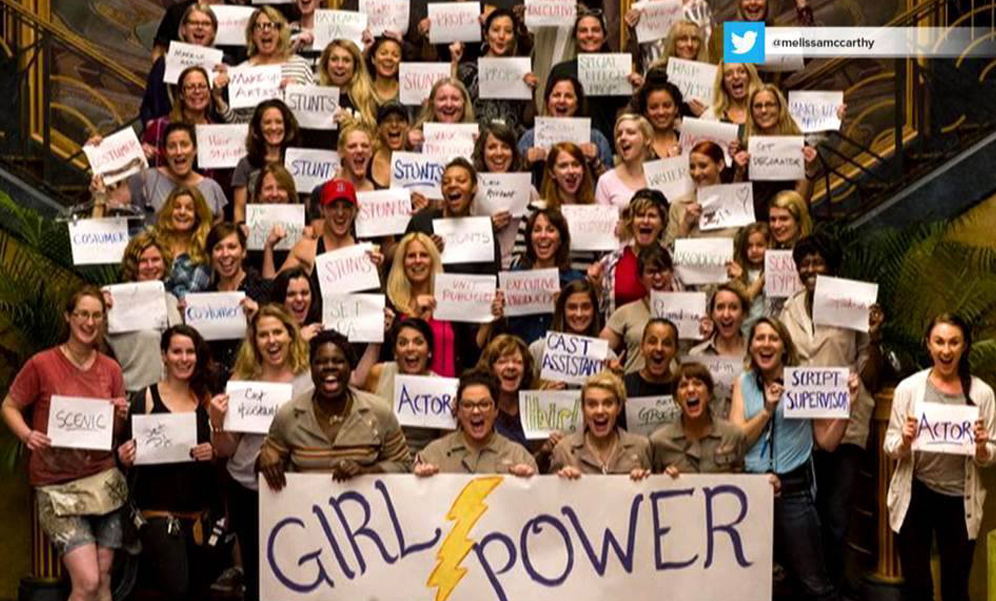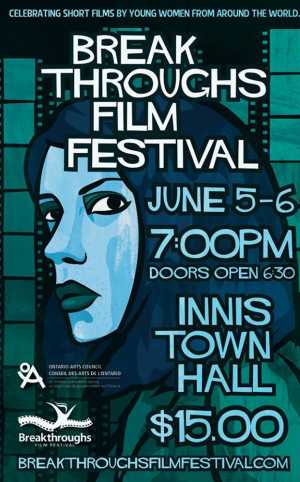I was surprised (because it doesn’t seem to be that way now) when I learned that some of the first filmmakers and studio powers were women. But times have changed. The film industry continues to be dominated by men. The absence of women that make hiring decisions results in a less varied workforce.

Women in positions of power
Women in positions of power are more likely to employ other women. This is a change that we need. It is paramount to promote equal opportunities for women, encourage creative projects by women, and expand and enhancing portrayals of women in all forms of global media.
Women are consistently underrepresented within the film industry. The struggle to get female work seen and heard is a main part of why we work on a festival such as Breakthroughs.
Some of the many things that need to take place are: enhancing the international visibility of women in the entertainment industry; encouraging international communication and cooperation; stimulating professional development and global networking opportunities and developing bold projects and initiatives, among others.
One of the ways to achieve this is by providing a space where women can present their work.
Breakthroughs Film Festival
This is the case of Breakthroughs Film Festival, the only festival in Canada devoted exclusively to short films by merging women filmmakers. Movies from every genre are presented.
Solkes: What is the main difference between this Film Festival and other short film festivals?
Gabor Petric, Executive Director at Breakthroughs Film Festival: The Breakthroughs Film Festival is the only festival in Canada devoted exclusively to short films by New Generation women filmmakers. We show films in any and every genre made by talented young artists from all over the world.

Solkes: Why create a Film Festival for women?
G.P: We want to give opportunities for young female filmmakers to get their films in front of audiences and to engage in discussions about both the amazing work they are putting forth and the challenges of representation they face within the film community.
This answer I loved. The idea of a group of people who came together a few years ago and decided to support women in the industry is something to feel happy and proud of. It hasn’t been an easy path. As always, there are obstacles to overcome and to become a platform for the arts takes a lot of time and dedication.
It is important to know that the National Film Board of Canada (NFB) has decided that they will spend half of the production money on female-directed films. According to a recent report, women represented only 17% of directors, 22% of writers, and 12% of cinematographers in films produced between 2013 and 2014 in Canada.
Systematic barriers
However, whether onscreen or behind the scenes, women’s careers are often failing to keep up with those of their male counterparts. Correspondingly, leading figures in cinema are asking and demanding to expand and augment diversity in the industry.
It is sad to say this but there are “systemic barriers” to advancement in both creative and decision-making areas in the independent production sector in film, TV, and digital platforms.
Women make up less than 20 % of directors and 21 percent of screenwriters in Canadian feature films.
Filmmaking is an incredibly competitive industry, one where countless people have stories to tell and the means to do so.
But truly understanding the importance of such a festival is easier said than done.
We are all aware that there are many film festivals around the world. So my mind continued to wonder.
Solkes: Why is it important to support young women filmmakers and women in the film industry in general?
G.P: New filmmakers may feel as though their voices get lost in the shuffle. It can be a disheartening thing to put time, passion, and energy into a project that ultimately doesn’t get support in one way or another. By providing a platform for young female filmmakers to showcase their work, we are trying to encourage creativity and conversation.
G.P: Year by year, we want to grow the festival into a place that showcases the up-and-coming talents within the film industry. Our central goals are always to be a voice for the incredible art being made by young women and a destination spot for anyone who believes in and supports their work.

Solkes: In 2012, women comprised 18% of people in the industry (directors, executive producers, producers, writers, among others)… have you seen a change?
G.P: I think we are living in a cultural space where the conversations have become more public and transparent about women in the film industry. There have been some powerful voices worldwide speaking on the issues that women have faced and continue to face in their respective film communities. The struggles and imbalance are still very present, however, the more we engage in open dialogue, the better. It creates awareness and opportunities for engagement and change. We aim to be part of the conversation, and to lend our support in the ways that we can.
Solkes: How has the festival evolved in the past 5 years?
G.P: One of the biggest evolutions within the festival is recently opening it up to International films/filmmakers. In previous years, the festival showcased only local Canadian work but now that the festival has opened to submissions across the globe, we have an opportunity to showcase an incredibly diverse range of work that is being put out.
Most female directors began their careers in other areas of the film industry before making their directorial debut. A perfect example is Alice Guy Blanché, who is credited as being the first female director. Her career began in France at Gaumont Film Company and directed her first film in 1896 and she directed all films made by the studio until 1905. Movies that were directed by females carried, for some reason, more moral weight. So, if women had such an impact at the beginning of the industry what happened?
Furthermore, the director is considered the general, and just like in the military, many people can’t seem to grasp the idea of a female in charge. The film industry still insists on telling most stories from a male point of view and even if women write male-driven fare, they’re assumed to be less competent at it. They still insist on undermining women.
Solkes: Do you think the Film Industry is sexist by definition?
G.P: I think systems have been in place for a long time where unfair advantages have been given that have excluded women from getting their work the balanced support they deserve. On a purely statistical level alone, the numbers don’t check out in terms of proper equality in various facets of the film world. As such, the roles of women have been severely underrepresented, which is exactly why it is so important to listen to the many female voices engaging in discussions about these issues.
Solkes: Why is it that people insist on presenting movies from a male point of view?
G.P: To echo parts of the question before, systematically there have been more male filmmakers who have opportunities to create and share their work. By having that in place, it tips the scales in favor of male perspectives. On the other hand, it has been my experience that there is a lot of female camaraderie in the industry. A sisterhood of sorts.
Solkes: What are your thoughts regarding the fact that there is deep-seated discrimination and pervasive stereotyping of women and girls by the international film industry?
G.P: There are indeed some consistent poor representations of females within films worldwide. However, as a result of this, I think it’s important to highlight the works that showcase the opposite. I think to shift the negative stereotyping and modes of representation, we should be looking at the films and filmmakers who are providing balanced, complex stories of women. There is such remarkable work out there across the world and through every genre, where you get a chance to see rich, powerful female perspectives. Unfortunately, it may take a bit more digging to seek out, however, what you can find is so unbelievably worth it.
Solkes: Do you think that movies directed by women are different than those directed by men, why or why not?
G.P: I think every film that has a different director is different from one another. Even a single director can change styles with any new project she/he is working on. I don’t think there is inherently such a thing as a “female film” or “male film”. That’s the beauty of this art form- it is full of so many different viewpoints.

Solkes: What is the motivation behind the Breakthroughs Film Festival?/p>
G.P: The festival’s mandate has always been to showcase great work by young, emerging female filmmaking talent. We love seeing these films and we want to be able to share them with audiences seeking out new work and new voices.
Solkes: Why does the festival have this name? Does is mean anything?
G.P: “Breakthroughs” refers to the struggles women artists continue to face in an industry where they make up a small fraction of directors and must work even harder than their male counterparts to make their voices heard.
Solkes: What do you consider to be a great film?
G.P: There are way too many various elements that could make a great film, so for the sake of brevity, I can safely say that a great film is one worth watching.
Solkes: What can people expect in the new edition of this year’s film festival?
G.P: I think audiences will be able to see a diverse selection of short films from local and international talents. These films showcase filmmakers who may not have had their names written up on a marquee or adorned with laurels just yet. However, that is part of the excitement of it, the opportunity to see the fresh, creative viewpoints of young women who will hopefully continue making work we can watch year after year.
Solkes: If there is a young woman who wants to make movies out there and she is reading this article. what would you tell her?
G.P: If you have a story to tell, tell it. Find a way to film your passions. Creating art is one of the most amazing things human beings are capable of doing and if you have the desire to create it then be bold, don’t censor, and give it life. And of course, once it’s done, submit it to Breakthroughs.
Female creation

There are still far more men than women working in almost every field in the film industry, and it’s not because women aren’t interested in those jobs.
Women have been central to the film industry since its origin. In all sorts of films; shorts, documentaries, and silent or full-length films women have influenced the trajectory of the industry.
I think it’s great to talk about women in the film industry. I want it to be part of the conversation. We need to break this ridiculous pattern where year in, year out, nothing changes. As a creative woman, I am glad a festival such as Breakthroughs Film Festival is opening a space for all of us. Thanks for breaking the lens! We are thankful for their belief in us and even more so, we are thankful that they have chosen to let brilliant artists present their work to the world.


